Top Foods To Avoid During Pregnancy
I’m Pregnant. Do I really need to give up deli-meat & brie cheese? Short answer, it depends…
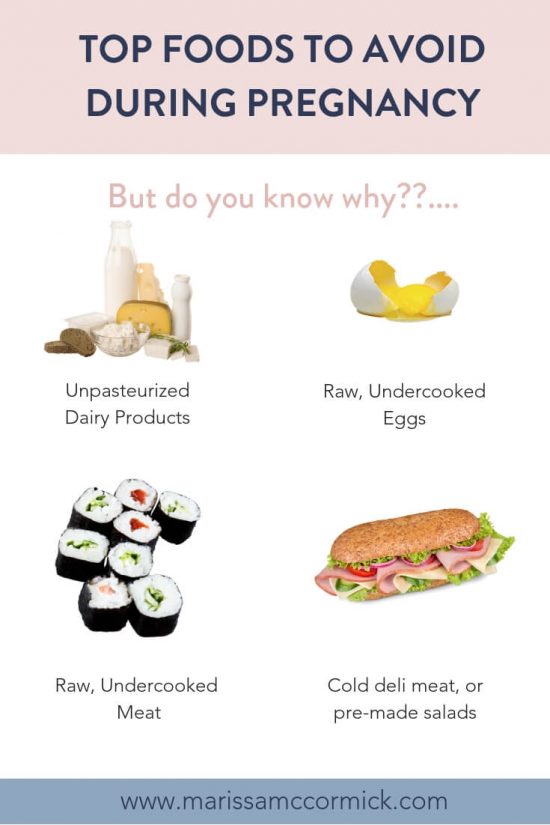
What can and can’t I eat is one of the top questions I get from soon-to-be mamas. It’s a valid question, and one I certainly had myself. But instead of just handing over a list of “Eat This, Not That,” it’s important to understand WHY behind the not so black & white list of foods. When it comes to foods to avoid during pregnancy, the “No” list exists because of food safety risk, not necessarily the food itself.
Let’s start from the beginning.
Everyone is susceptible to contracting a foodborne illness. However, pregnancy compromises the immune system, making pregnant women more at risk for developing foodborne illnesses. Pregnant women aren’t the only ones at risk though, young children, the elderly, and people with a weakened immune system are also at higher risk for contracting a foodborne illness.
Two foodborne illnesses that can have serious complications during pregnancy are Listeriosis and Toxoplasmosis.
-
Listeriosis, caused by the harmful bacterium, Listeria monocytogenes, can cause miscarriage, premature delivery, serious sickness, or death of a newborn baby.
CDC estimates that Listeria is the third leading cause of death from food poisoning in the United States. While it might sound scary, perspective on how rare it is, about 1,600 people get sick from Listeria each year, and about 260 die. However, pregnant women and unborn children are at higher risk of developing Listeriosis. “About one-third of listeriosis cases happen during pregnancy.” Pregnant women with Listeriosis typically experience fever and other flu-like symptoms, such as fatigue and muscle aches (read more at “What are the symptoms of listeriosis?“).
-
Toxoplasmosis, caused by the parasite, Toxoplasma gondii, which can be found is various food sources, as well as dirty cat litter boxes and other areas where cat feces can be found. Toxoplasmosis can cause miscarriage, newborn death, blindness and other congenital abnormalities either at birth or later in life.
The Centers for Disease Controls (CDC) states that Toxoplasmosis is a leading cause of death from foodborne illness in the United States (with about 330 deaths annually). More than 40 million people in the United States may be infected with the Toxoplasma parasite. Of those infected however, very few have symptoms because a healthy person’s immune system usually keeps the parasite from causing illness. Other times the symptoms are absent or so mild that the mother doesn’t even know that she’s been infected, but she’s still passing the infection to her unborn child – who may then experience serious effects from the illness. Generally speaking, if you were infected with Toxoplasma before becoming pregnant your unborn child is protected by your immunity. Learn more on the CDC website on Toxoplasmosis, how to avoid it (especially if you own a cat or around cats).
Some foodborne illnesses, such as Listeria and Toxoplasma gondii, can infect the fetus even if the mother does not feel sick. This is why doctors provide pregnant women with specific guidelines about foods that they should and should not eat.
Certain foods, like refrigerated deli meat, soft cheese from unpasteurized milk, & food prepared in an unsanitary manner, pose a greater risk for carrying Listeria &/or foodborne illnesses. These include foods such as: certain ready-to-eat foods, refrigerated smoked fish, refrigerated lunch meats, and soft cheeses made from unpasteurized milk.
Now, don’t freak out & stop eating all meat, cheese, or fresh fruits & veggies (yes, I’ve seen women do this). While there are certain foods that pregnant women should avoid to decrease the risk of foodborne illness during pregnancy, let’s talk about how to make safer food choices!
A SHORT LIST OF FOODS TO AVOID:
- Avoid raw (unpasteurized) milk & products made from it. Look for the word “pasteurized” on the food label. Most people are surprised to learn that most brie, feta or quesos are actually pasteurized & fine to eat! Check labels, ask the restaurant. If in doubt, skip it.
- Don’t eat eat raw or lightly cooked sprouts (including alfalfa, clover, radish, & mung bean sprouts). Cook thoroughly if you choose to eat sprouts.
- Avoid eating hot dogs, deli meats, or premade meat or seafood salad (e.g chicken salad), unless they are heated to an internal temperature of 165°F or steaming hot just before serving.
- Practice safe food handling by washing fruits & veggies, following proper food storage, & paying attention to use by dates.
- Remember, food isn’t the only thing to avoid during pregnancy. Check out another blog post on the 10 Thing To Avoid During Pregnancy.
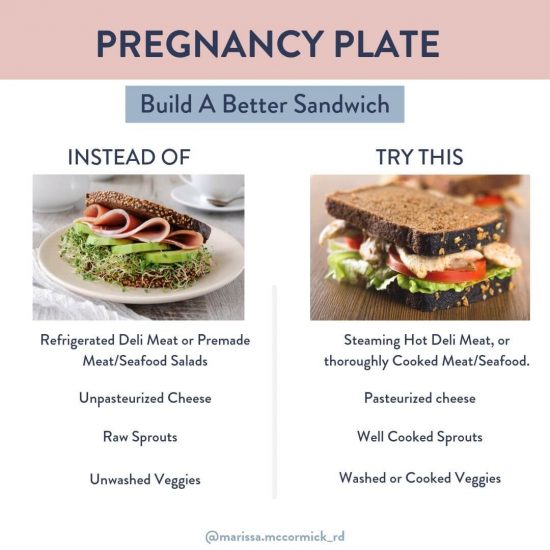
Here’s the deal, just about anything you eat poses some risk for foodborne illness, with some foods posing a slightly higher risk of carrying Listeria. Pregnancy is a critical time period where there’s reason to be extra cautious (but still realistic!!).
I gave you the short synopsis above, & the details below are pulled from the U.S. Department of Health & Human Services website, Foodsafety.gov. Read below for a deep dive into the specifics.
People at Risk: Pregnant Women
Download full-resolution infographic
Advice Regarding Seafood
Women who are pregnant or may become pregnant—as well as breastfeeding mothers and parents of young children – should make informed choices when it comes to seafood. Fish is one source of high quality protein, minerals, and vitamins that are beneficial to overall health. However, it is important to choose fish that are safe to eat and offer health benefits. Follow FDA and EPA’s advice on eating fish by using this chart and a set of frequently asked questions and answers to choose healthy and safe options.
Cook seafood thoroughly: All seafood dishes should be cooked to 145°F. Raw seafood may contain parasites or bacteria, including Listeria, that can make pregnant women ill and could potentially harm their babies. This means that you should avoid:
- Sushi
- Sashimi
- Raw Oysters
- Raw Clams
- Raw Scallops
- Ceviche
Take care with smoked seafood: Refrigerated smoked seafood presents a very real threat of Listeria. Don’t eat refrigerated smoked seafood unless it’s in a cooked dish, such as a casserole, that reaches an internal temperature of 165°F to kill harmful germs.
Refrigerated smoked seafood, such as salmon, trout, whitefish, cod, tuna, or mackerel, are often labeled as:
- Nova-style
- Lox
- Kippered
- Smoked
- Jerky
It is OK to eat smoked seafood during pregnancy if it is canned, shelf stable or an ingredient in a casserole or other cooked dish.
Don’t Drink Unpasteurized Juice or Cider
Unpasteurized juice, even fresh-squeezed juice, and cider can cause foodborne illness. These beverages have been linked to outbreaks caused by E. coli and other harmful germs. To prevent infection, either choose a pasteurized version or bring unpasteurized juice or cider to a rolling boil and boil for at least 1 minute before drinking.
Avoid Raw Milk, Raw Milk Soft Cheeses, and Other Raw Milk Products
Raw milk is milk from any animal that has not been pasteurized to kill harmful bacteria. Raw milk, also called unpasteurized milk, may contain bacteria such as Campylobacter, E. coli, Listeria, Salmonella or the bacteria that causes tuberculosis. To avoid getting these foodborne illnesses, only consume pasteurized milk and milk products, including cheese.
Don’t eat the soft cheeses listed below unless they’re made with pasteurized milk. Make sure the label says “made with pasteurized milk.”
- Brie
- Feta
- Camembert
- Roquefort
- Queso blanco
- Queso fresco
Cheese made with unpasteurized milk may contain E. coli or Listeria. Instead of eating soft cheese, eat hard cheese such as Cheddar or Swiss.
Pregnant woman should pay particular attention at farmers’ markets to make sure that fresh and soft cheeses are pasteurized.
Cook Eggs Thoroughly
Undercooked eggs may contain Salmonella. Cook eggs until the yolks and whites are firm to kill germs. If you are making a casserole or other dish containing eggs, make sure the dish is cooked to a temperature of 160°F. Make sure that foods that contain raw or lightly cooked eggs are made only with pasteurized eggs. Do not eat foods that may contain raw eggs, such as:
- Homemade eggnog
- Raw batter
- Homemade Caesar salad dressing
- Tiramisu
- Eggs Benedict
- Homemade ice cream
- Freshly made or homemade hollandaise sauce
Don’t Eat Premade Meat or Seafood Salad (Such as Deli Chicken or Tuna Salads)
Don’t buy or eat premade ham salad, chicken salad, or seafood salad which may contain Listeria. These items are commonly found in delis.
Do Not Eat Raw Sprouts
Raw or undercooked sprouts, such as alfalfa, clover, mung bean, and radish may contain E. coli or Salmonella. Cook sprouts thoroughly.
Avoid Undercooked Meat and Poultry
All meat and poultry should be thoroughly cooked before eating. A food thermometer should be used to ensure that the meat has reached the USDA-recommended safe minimum internal temperature. Visit minimum cooking temperatures for specific details.
Following the minimum recommend internal temperature is important because meat and poultry may contain E. coli, Salmonella, Campylobacter, or Toxoplasma gondii.
CDC recommends the following preventive measures to reduce the risk of contracting toxoplasmosis from eating meat:
- Cook meat to the USDA-recommended minimum safe internal temperature.
- Freeze meat for several days at sub-zero (0 °F) temperatures before cooking to greatly reduce chance of infection.
- Wash cutting boards, dishes, counters and utensils with hot, soapy water after contact with raw meat, poultry, seafood, or unwashed fruits or vegetables.
- Wash hands with soap and water.
Reheat Hot Dogs and Luncheon Meats
Reheat these meats to steaming hot or 165°F before eating, even though the label says precooked. These meat items may contain Listeria and are unsafe to eat if they have not been thoroughly reheated.
- Hot dogs
- Luncheon (deli) meats
- Cold cuts
- Fermented or dry sausage
- Any other deli-style meat and poultry
Be Selective with Meat Spreads or Pâté
Do not eat refrigerated pâtés or meat spreads from a deli or meat counter, or from the refrigerated section of a store. They can contain Listeria. Meat spreads and pâté that do not need refrigeration before opening, such as products in cans, jars, or sealed pouches, are a safer choice. Refrigerate these foods after opening.
Don’t Eat Raw Dough
Unbaked (raw) dough or batter can make you sick. Flour hasn’t been treated to kill germs like E. coli. Raw eggs can contain Salmonella. Make sure batter is thoroughly baked or cooked before eating.
Wash All Fruits And Vegetables
Consumers are advised to wash all fruits and vegetables under running water just before eating, cutting or cooking, even if you plan to peel the produce first. Scrub firm produce such as melons and cucumbers with a clean produce brush
Eat cut melon right away or refrigerate it at 40° F or colder and for no more than 7 days. Throw away cut melons left at room temperature for more than 4 hours.
Did you have any surprises about what foods to watch out for during your pregnancy?
For tips on meal prep and meal planning, make sure to grab my FREE Nourished Mom’s Guide!
Additional Resources
Food Safety for Pregnant Women
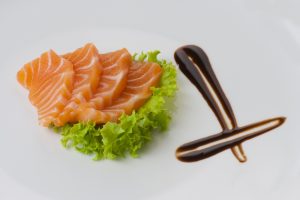
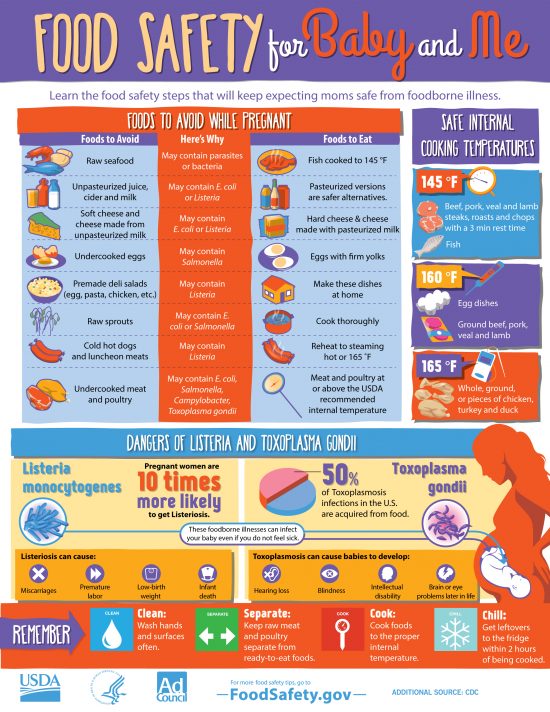
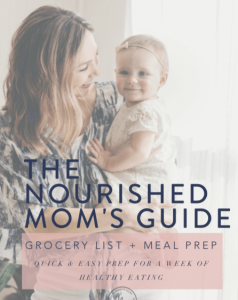
Be the first to comment